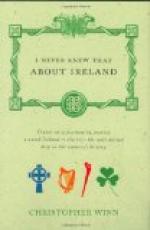So many things have conspired to make this Irish question a Gordian-knot which no man can untie, and but few would dare to cut. The past extravagance of the landlords, absenteeism, rack-renting, injustice of all kinds; the past jealousy of England and her over-shadowing all native industries and productions; difference of religion, racial temperament, and the irreconcilable enmity of the conquered towards the conquerors; ignorance and idleness; the morality which marries too early, when the land, which was just enough to support one family, is expected to keep three or four; want of self-respect in the dirt and disorder of domestic life; want of all communal life or amusement, save in heated politics and drink; bogs here, unthrift there, small holdings everywhere—all these things help to complicate a question which passion has already made too difficult for even the most radical kind of statesmanship to adjust. All the panaceas hitherto tried have been found ineffectual. The repeal of Catholic disabilities, the establishment of national schools, the disestablishment of the Protestant Church, the Maynooth grant, the various Land Acts—all have done but little towards the settlement of the question, which, like certain fabulous creatures, has increased in strength and the extensions of its demands by every concession made. The best chance yet offered seems to be in the quiet working of Lord Ashbourne’s Act, by which the tenant becomes the owner and the landlord is not despoiled. And certainly the crying need of the moment is legislative finality and political rest. Existing machinery is sufficient for all the agrarian ameliorations demanded. To do much more would be to act like children who pluck up their seeds to see how they are growing, leaving nothing sufficient time for development or reproduction.
No one would deny such a measure of Home Rule to Ireland as should give her the management of her own internal affairs, in the same manner and degree as our County Councils are to manage ours. But this is not the Home Rule demanded by the leaders of the party. That for which they have taken off their coats means the loss of the country as an integral part of the Empire; the oppression and practical annihilation of the Protestant section; the opening of the Irish ports to all the enemies of England; or the breaking out of civil war in Ireland and its reconquest by England. The alternative scheme of federation is for the moment unworkable. But to hand over the whole conduct of Irish affairs to the Roman Catholic majority would be one of those ineffaceable political crimes the greatness of which would be equalled only by the magnitude of its mistake. The language of the indigenous Home Rulers and their Transatlantic sympathisers—as well as the things they have done and are still doing—ought to be warnings sufficiently strong to prevent such an act of folly and wickedness on our part. Even our men—men of light and leading like Mr. John Morley—seem to lose their heads when they approach the Irish question and to become as rabid in their accusations as the paid political agitators themselves. I will give these two short extracts, the one from Mr. Morley’s speech at Glasgow, and the other from Lord Powerscourt’s temperate and rational commentary:—




